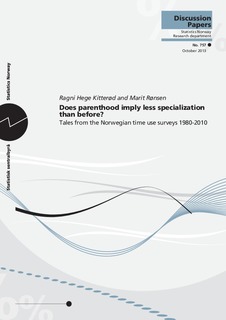| dc.contributor.author | Kitterød, Ragni Hege | |
| dc.contributor.author | Rønsen, Marit | |
| dc.coverage.spatial | Norway | nb_NO |
| dc.date.accessioned | 2019-11-12T10:33:34Z | |
| dc.date.available | 2019-11-12T10:33:34Z | |
| dc.date.issued | 2013-10 | |
| dc.identifier.issn | 0809-733X | |
| dc.identifier.uri | http://hdl.handle.net/11250/2627901 | |
| dc.description.abstract | The presence of children still tends to reinforce a traditional division of labour in couples in many countries. This paper explores possible changes in the relationship between parenthood and the division of labour in Norway from 1980 to 2010 – a period with reduced gender differences in time spent on paid and unpaid work and the implementation of several work-family policy reforms. Parenthood intensified a traditional division of labour less in 2010 than in 1980, but there was no linear time trend. In 1980, parents with children in all age groups had a more traditional division of labour than those with no resident children. In 2010, this was the case only for parents with very young children (0-1 years), and even for this group, the difference compared to people without resident children was more modest than previously. As for household work, the presence of children in most age groups still strengthened a traditional division of labour in 2010, although less so than before. | nb_NO |
| dc.description.sponsorship | Ministry of Children, Equality and Social Inclusion | nb_NO |
| dc.language.iso | eng | nb_NO |
| dc.publisher | Statistisk sentralbyrå | nb_NO |
| dc.relation.ispartofseries | Discussion papers;757 | |
| dc.subject | JEL classification: D13 | nb_NO |
| dc.subject | JEL classification: J18 | nb_NO |
| dc.subject | JEL classification: J22 | nb_NO |
| dc.title | Does parenthood imply less specialization than before? Tales from the Norwegian time use surveys 1980-2010 | nb_NO |
| dc.type | Working paper | nb_NO |
| dc.description.version | publishedVersion | nb_NO |
| dc.subject.nsi | VDP::Matematikk og Naturvitenskap: 400::Matematikk: 410::Statistikk: 412 | nb_NO |
| dc.source.pagenumber | 52 | nb_NO |
